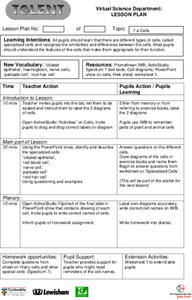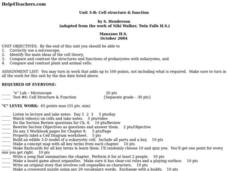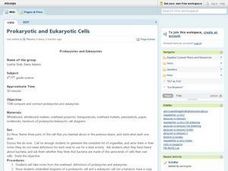Curated OER
Where Are The Dinosaurs?
Students examine the concept of extinction in relationship to the dinosaurs. In this elementary science lesson students become familiar with dinosaurs and that they are extinct. Students differentiate between different types of dinosaurs.
WeTransfer BV
Paper by FiftyThree
There is no such thing as someone who is not artistic when using this app. In fact, this is the type of app that makes you want to go out and buy a tablet computer. Whether you have a creative lesson planned, or just need a place to take...
Curated OER
It Ain't Easy Being Green!
Students explore the needs of plants. In this science lesson plan, students plant seeds and place one in a sunny spot and the other in a dark area. Students observe what happens.
Curated OER
Cells
Students explore the types of cells and their appropriate function. After observing a PowerPoint presentation, students draw diagrams of cells. Using a specified website, students identify parts of plant and animal cells. They answer...
Curated OER
Plentiful Plants Book Review
In this literature worksheet, learners choose a nonfiction book about plants to read and report about. They note the title, author, illustrator, and publisher. They follow five directions to draw and label plant diagrams, make charts,...
Curated OER
Lesson 3: Life Cycle of Brassica Plants
Students investigate the life cycle of brassica plants. For this science lesson, students observe each stage in the life cycle of their plant. Students record their observations and graph the data. Students
Curated OER
Nuts About Peanuts
First graders explore peanuts. In this peanut lesson, 1st graders examine the parts of peanut plants and identify them. Students plant their own peanut plants and chart their growth.
Curated OER
What is Inside a Seed?
Students observe how the bean seed has changed after being soaked in water overnight and record their observations. They open the bean and observe the inside. Finally, students draw and label the parts of a bean seed and write the...
Curated OER
Cell Organelles
Students explore biology by researching living cells. In this living organism lesson, students participate in a role-playing activity in which all the students in class form one plant cell by portraying specific parts of a cell. Students...
Curated OER
Characteristics of Plants
In this characteristics of plants activity, students conduct an experiment on how a vascular plant moves nutrients to all its parts. They describe the difference between the celery leaf from sugar water and plain water. Students also...
Curated OER
Salt is Good On Sunflower Seeds, But What About Cypress?
Young scholars record their observations about growing a cypress plant and putting salt in the plant. In this cypress plant lesson plan, students observe and record what is happening as the cypress plant grows. This gives directions for...
Curated OER
Cell Factory
Young scholars examine the basic structures and functions of cells. They design and construct a factory cell model where each factory part corresponds to a cell part.
Curated OER
4-H Horticulture/Garden Activity Page- Beginning
For this 4-H garden project worksheet set, student study the parts of seeds and plants. They make a mini-greenhouse. They complete a career scavenger hunt, tools word search, and experiment to learn more about the effect of water on seed...
Curated OER
Day and Night in the Desert
Students illustrate scenes showing day and nighttime activities in the desert. They include plant and animal life including predators and prey.
Curated OER
Creating an Experimental Design
Students research the damage to the environment by certain plant species. They create an experimental design which they test how these species take over certain habitats. They share their information with the class.
Curated OER
Something's Fishy
Students study fish habits and traits. In this marine life lesson, students complete four learning centers of a fish memory game, a fish habitat study, draw and glue fish craft activity, and a fish read-a-thon. Students complete their...
Curated OER
Herb is the Word
Learners graph the data collected on seedling establishment and
survival for each soil type over a 6 week period. Each lab group graphs data
gathered from one plant. They choose a color for each soil type and create a key for the...
Curated OER
Pumpkin Science
Students investigate how plants grow by analyzing pumpkins. For this agricultural lesson, students read The Biggest Pumpkin Ever by Steven Kroll, and draw pictures of a pumpkin in each of its growing stages. Students measure and dissect...
Curated OER
Beef Is Good For You
Students discuss as a class the need for a healthy diet. They bring in a food product and analyze the nutrition label. Using the labels, they complete a worksheet and chart the nutrients found in beef. They use a scale to see how...
Curated OER
Prokaryotes and Eukaryotes
Students study prokaryotes and eukaryotes and compare and contrast them. They review the parts of the cell and define th eterms prokaryotes and eukaryotes. In pairs, they identify the organelles in a prokaryotic cell and a eukaryotic...
Curated OER
Cell Organization
In this cell organization worksheet, 9th graders complete the table with each correct cell part and function for that particular part. Then they label the animal cell and the plant cell diagrams with each cell part.
Curated OER
Cell Structure and Function
High schoolers identify the main ideas of different cell theories. Using a microscope, they compare and contrast the structures and functions of prokaryotes and eukaryotes. They also compare and contrast animal and plant cells and...
Curated OER
The Incredible, Edible Cell
Students discover organelles and the functions organelles perform in cells. For this biology lesson, students create model cells using Jell-o, then dissect their "cell" to examine the parts that create a cell. Students create a diagram...
Curated OER
Prokaryotic and Eukaryotic Cells
Students compare and contrast prokaryotes and eukaryotes. They name the organelles that are present in prokaryotes only and identify their functions. Students label the diagrams of the prokaryotic cell and the eukaryotic cell.























